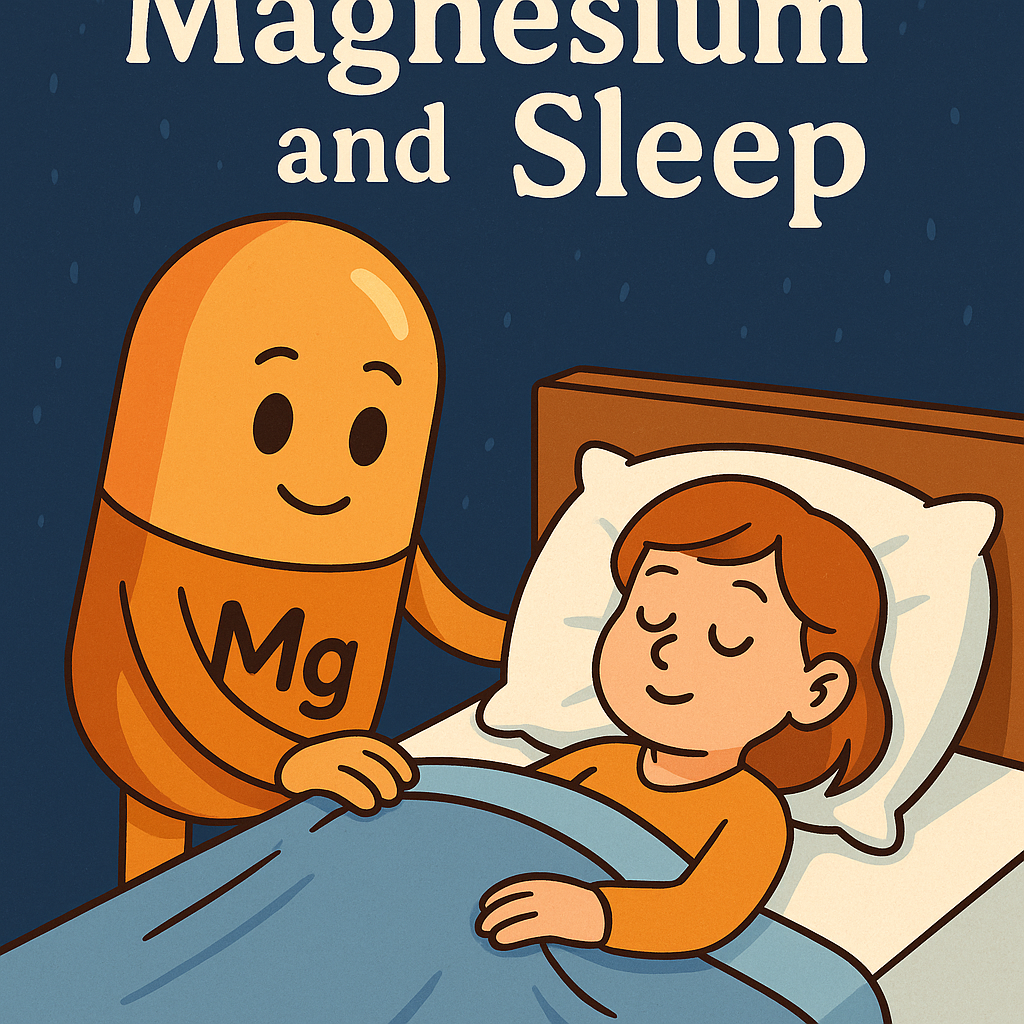Magnesium and Sleep: Can a Simple Supplement Really Help You Rest Better?

Health & Sciences | The Varrock Street Journal
Hello readers! I hope each and every one of you had a wonderful night of sleep. For today's article, I would like to focus on that.
If you’re anything like me, the quest for better sleep can sometimes feel like a science experiment. Recently, I started taking magnesium as a supplement, hoping it might help with nighttime rest—and I’m not alone. Magnesium has gained popularity for everything from muscle cramps to mental clarity, but especially for its rumored role in calming the nervous system and promoting sleep.
In today’s newsletter, we’ll take a closer look at what magnesium actually does, how it may (or may not) support sleep, and what risks or benefits you should consider before making it a nightly habit.

🧪 What Is Magnesium and Why Do We Need It?
Magnesium is an essential mineral and electrolyte that plays a role in over 300 biochemical reactions in the human body. It helps with:
- Muscle and nerve function
- Heart rhythm regulation
- Blood sugar control
- Energy production and metabolism
- Bone development
Despite its importance, many people—up to 50% of U.S. adults—consume less than the recommended amount through diet alone.
😴 Magnesium and Sleep: What the Research Shows
Magnesium plays a key role in calming the nervous system by binding to GABA receptors, the same neurotransmitters that promote relaxation and reduce anxiety. Here’s what the science says:
- Improved sleep quality: Some studies have shown that magnesium supplementation can improve sleep onset, duration, and quality, especially in older adults or those with insomnia.
- Reduced nighttime awakenings: Magnesium may help prevent frequent nighttime waking, likely due to its ability to regulate melatonin and lower cortisol (stress hormone) levels.
- Helps with restless leg syndrome: People with this condition sometimes benefit from magnesium, which can reduce muscle twitching and cramping that interrupt sleep.
However, the research is still mixed—and more large-scale trials are needed to confirm just how effective magnesium is for the general population.
Here is a brief video helping explain what neurotransmitters are!
💊 Other Health Benefits of Magnesium
In addition to sleep support, magnesium supplementation may also help:
- Reduce migraines
- Ease muscle cramps
- Lower blood pressure (especially in people with hypertension)
- Improve mood in mild anxiety or depression
- Stabilize blood sugar in people with insulin resistance or Type 2 diabetes
⚠️ Risks and Side Effects
Magnesium is generally safe, but excessive intake—especially from supplements rather than food—can cause:
- Diarrhea (especially with magnesium citrate or oxide)
- Nausea or stomach discomfort
- Electrolyte imbalances if combined with other medications (like diuretics)
- Kidney stress in people with pre-existing kidney disease
The upper limit for supplemental magnesium is generally considered 350 mg/day, though some people tolerate higher doses under medical supervision.
🍌 Best Natural Sources of Magnesium
Before reaching for a bottle, consider these magnesium-rich foods:
- Leafy greens (spinach, chard)
- Nuts and seeds (almonds, pumpkin seeds)
- Whole grains (brown rice, oats)
- Legumes (black beans, lentils)
- Bananas, avocados, and dark chocolate
🧠 Why This Matters
Sleep is foundational to health—and magnesium may offer a gentle, low-risk way to support it. But not everyone needs a supplement, and too much of a good thing can backfire.
Understanding when magnesium helps (and when it doesn’t) empowers people to make evidence-based, personalized choices about their well-being.
🌟 Spotlight on the Future
- Magnesium L-threonate, a new form, is being studied for its potential brain-penetrating effects
- Sleep researchers are exploring combined supplements (magnesium + melatonin + zinc) for synergistic effects
- Wearable sleep trackers may help individuals assess how supplements impact their rest in real time
😲 Did You Know?
- Magnesium deficiency is linked to chronic insomnia, fatigue, and anxiety
- People who drink lots of soda or alcohol may excrete more magnesium in their urine
- Magnesium is involved in the production of melatonin, the hormone that regulates your sleep-wake cycle
🧠 Reflection Questions
- Have you ever considered taking a supplement to support your sleep?
- How can diet and stress management be used alongside supplements for better rest?
- What’s the right balance between supplementation and food-based nutrients?
👋 Final Thoughts
Magnesium isn’t a miracle cure—but for some, it may be a missing piece of the sleep puzzle. If you’re exploring it for rest or relaxation, make sure to listen to your body, speak with a provider, and remember: every supplement is just one part of a bigger wellness picture.
📚 References
- National Institutes of Health. (2024). Magnesium Fact Sheet for Consumers. https://ods.od.nih.gov
- Sleep Foundation. (2023). Magnesium and Sleep. https://www.sleepfoundation.org
- Journal of Research in Medical Sciences. (2012). Effects of magnesium supplementation on insomnia in elderly.
- Mayo Clinic. (2024). Magnesium: Benefits, Dosage, and Risks. https://www.mayoclinic.org
📲 Rest easy and read weekly:
- Instagram: @thevarrockstreetjournal
- TikTok: @varrock.street.jo
